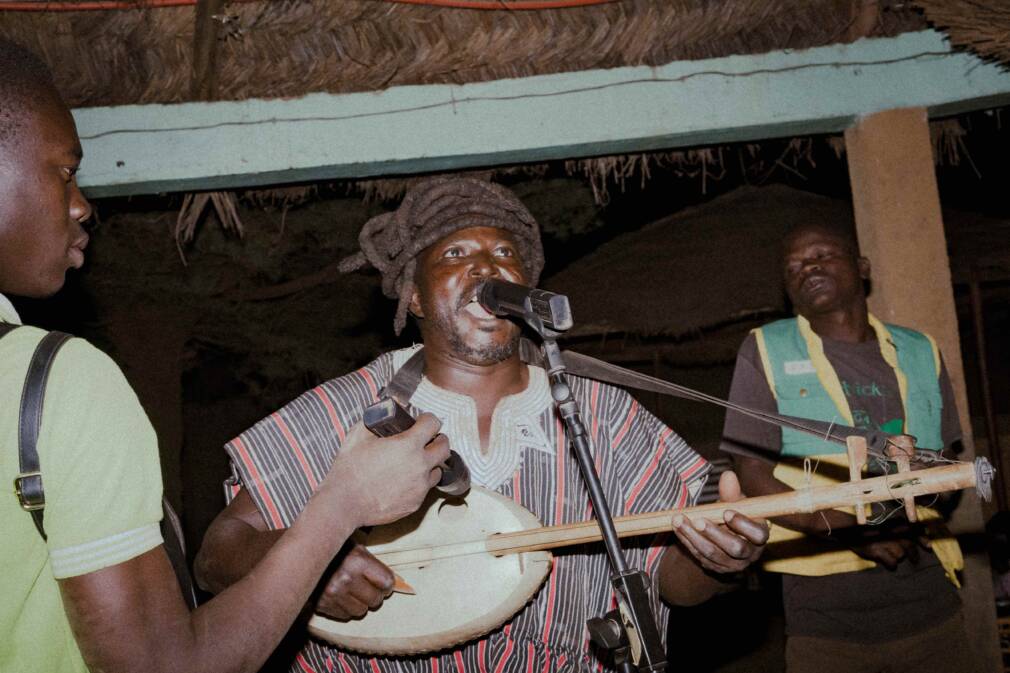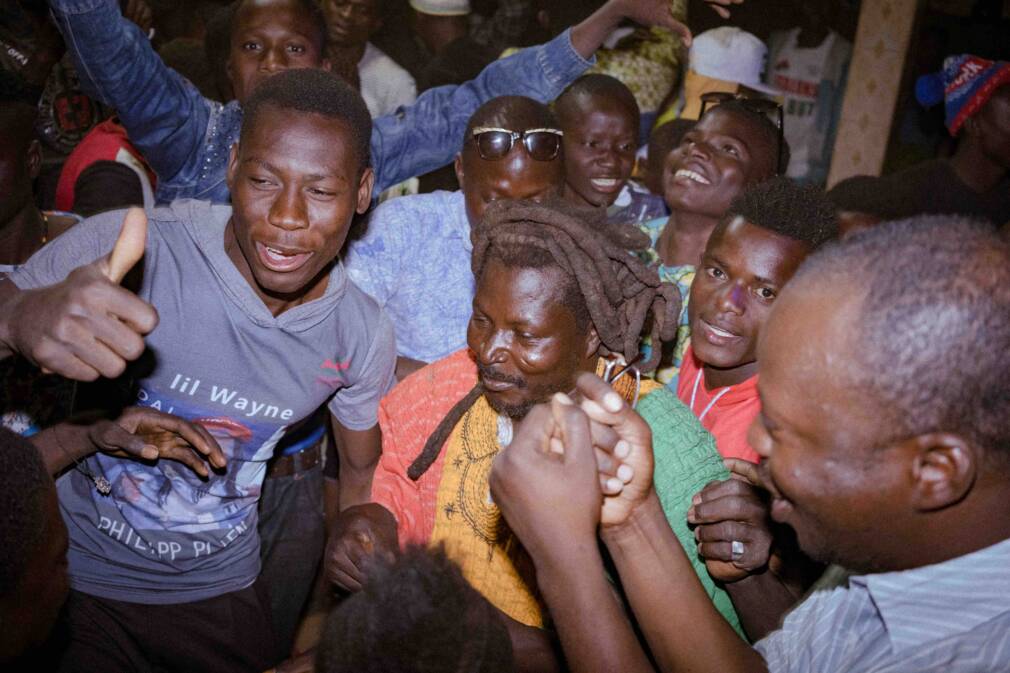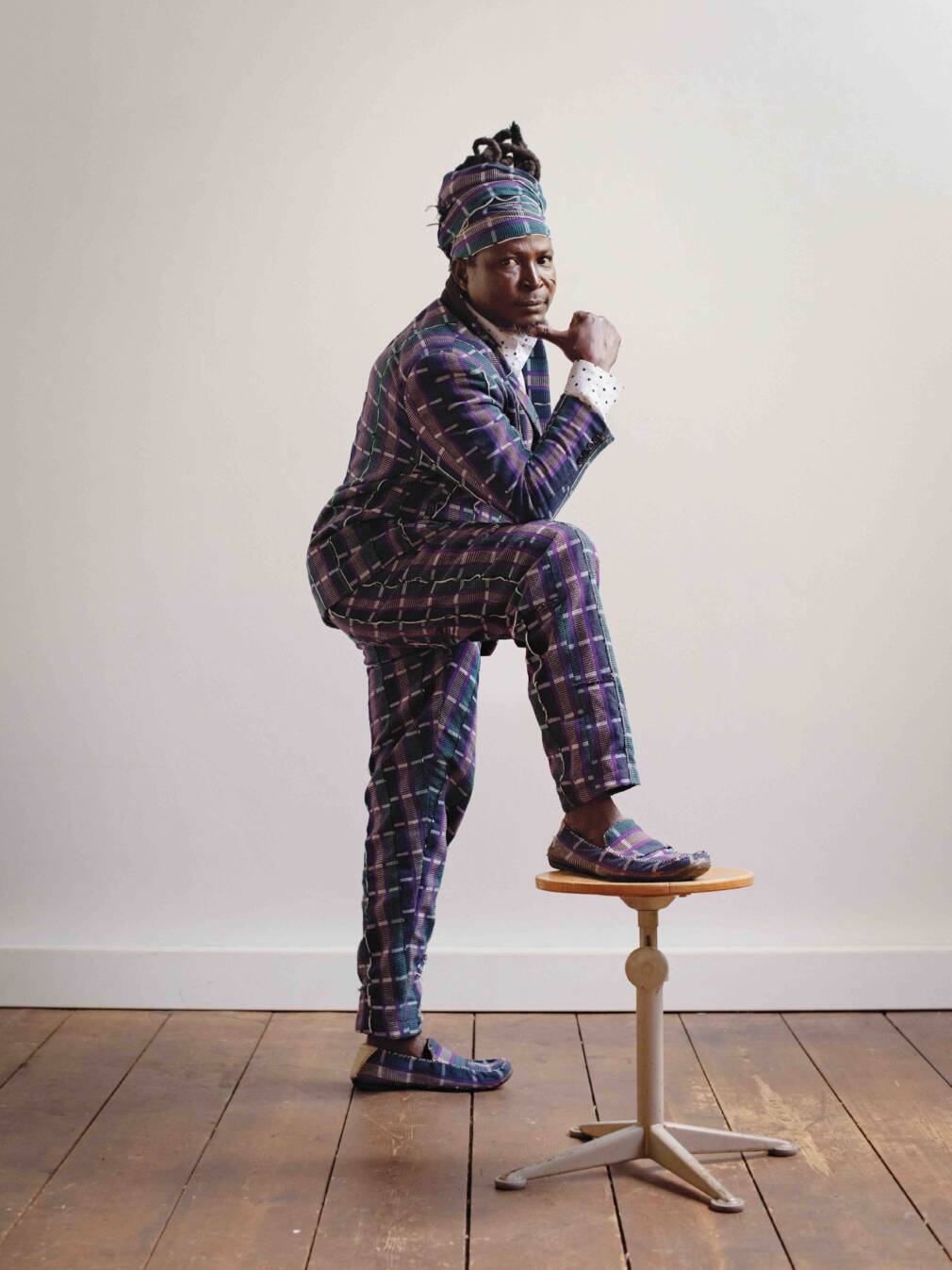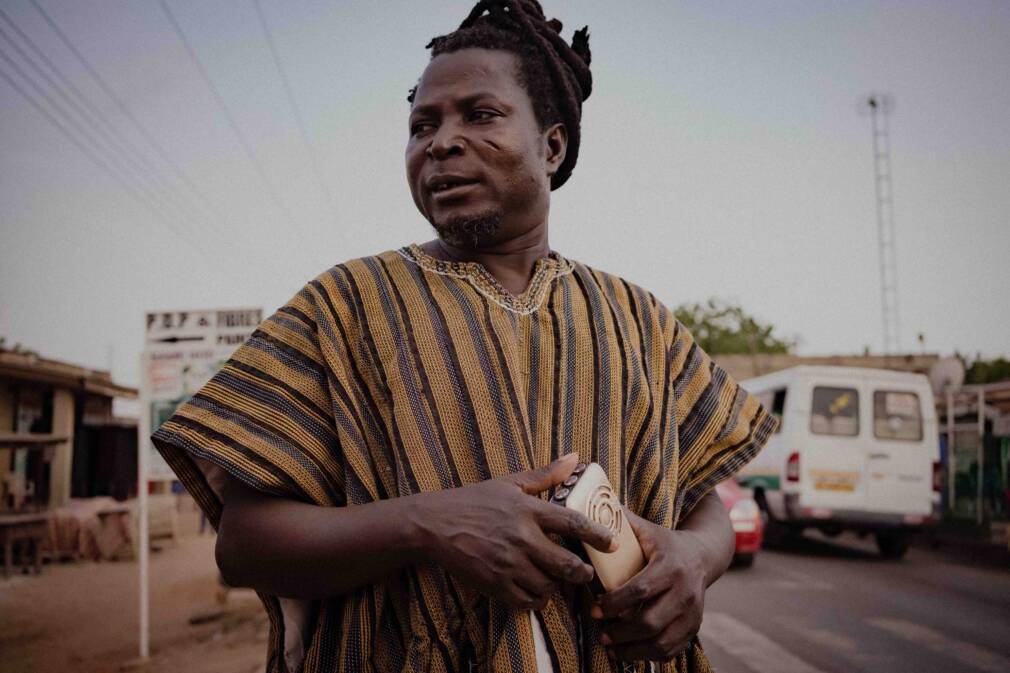Born Albert Apoosore, King Ayisoba is known to be a pioneer of mainstream traditional music in Ghana. Making his entrance into the music industry in the early 2000’s, he grabbed the attention of most Ghanaians, especially those living in modern cities both in and outside Ghana, with his sharp voice and live performances with his favorite kologo instrument. King’s interest in music began in his younger years where he recalls an interesting story as a young 3 year old living in a small village right outside Bolga. By then he still couldn’t walk and had the family worried. They had tried various ways to help him. One day a herbalist/ritualist came by the house and upon speaking to him for a bit asked for his father. When little Albert showed him where his father was, the man went to his father and advised him to make a small kologo guitar for his young son. Intrigued, his father went to different ritualists to verify and they all said the same. From then his father got him a kologo and he’s played it ever since. “I learnt on my own. My master is God,” Ayisoba says about how he learnt how to play in his usual pidgen english.
As he grew, and his skills sharpened, he started to play in local bars, markets, and funerals to get a name for himself in the local scene. King was creating music that was very unique at the time, so when it reached the capital Accra he gradually gained fame; respected for singing in local dialects such as Frafra, Twi, and pidgen English and also using traditional instruments. Ayisoba has managed to create a blend of local and foreign fan base as his lyrics, when understood, are drawn from his personal life and are sometimes funny, urgent, or imaginative.

The song that shot him into the limelight, “I want to see you my father” reached the hearts and minds of many Ghanaians. In the song, he admonished fathers to be responsible and stop spending the majority of their money on girlfriends. It’s a cry of a son who needs his father. The song was put on CD known as “Modern Ghanaians” and it contained songs with the flavor and spice of modern hip-life mixed with Ayisoba’s traditional style. It helped him win the Most Popular Song that year at the VGMAS.
“I set Kologo to my voice…I can use the kologo to play different music” King explains that like highlife music can grow into hip-life, traditional kologo music can evolve into what the youth want. King sees many instrumentalists always having to tune their instruments based on songs or sets but he says if they would look closely they would notice he only tunes his kologo guitar once at the start of his very long sets. He feels this distinguishes the kologo apart from other instruments. “I can play the guitar and gombe, but I wanted to focus on kologo to polish that well.”
“Work Hard” is King Ayisobas 10th album. The journey hasn’t been easy because of the diversity in world music presently. “If you don’t push promotion, nobody will hear you.” He says he started an initiative like the Batakari Festival as one of the ways to also do his part to keep his music as well as traditional music as a whole competitive in these ever changing times.
Ayisoba started recording the project in Holland but upon returning to Ghana as Covid hit, he was looking for ways to keep inspired and to keep working. Growing up in the hinterlands without basic school education, he has always believed in working hard so being idle was new to him. At that point, he was just at home but he refused to just stay indoors and instead decided to continue the project and focus all his energy on finishing it. He aptly titled the project Work Hard. Although he couldn’t go out to work, he would rather Work Hard on his music and his Album.
Indeed on the first song off the project titled “Good Things God Knows”, he features award winning reggae musician Ras Kuuku, and Twinkle. He urges his people to do everything possible, as hard as they can and leave the rest to God. He also directs his message to politicians who only make promises to get into office but turn their backs on their people once they get into these positions. Politics seems an important topic in his music as he touches on it again in another song titled “Kokoko Enter” where he talks about loose border restrictions at Ghanaian borders and how politicians are turning a blind eye to the corruption going on.
King speaks on other societal issues as well. Track 2, “Bossi Labome”, for instance, is a song about Northern traditional marriage rites and their beliefs. He describes how a husband goes to his partners’ fathers’ house to perform the necessary marriage rites in order to properly marry and how that is very sacred to his tribe. Ayisoba explains in local dialect that once they give the woman’s family the “guinea fowls and cola” the woman now belongs to the man in marriage. There is no going back and should the woman go outside the marriage to be with another man, death or illness will definitely follow. Ayisoba goes further to explain that these were methods in the old days to keep marriages and spouses in check. This is his own way of reiterating these traditions.

“Every song has its market, I made it for everybody,” he explains in Frafra. His music has been known to be personal, social and political and evidently he does that with this project. On a song like “People talk too much”, he inculcates the use of a Gombe bass drum, a flute accompanied with other traditional instruments along with his kologo. This is what you would notice as you delve into this very dynamic album. King disagrees with the notion that foreigners gravitate to his music more than local Ghanaians. He compares it to how Ghanaians received highlife, hip-life, and reggae music. If his fellow traditional acts adopted new ways to promote their music, and came together in full force that notion would change. He urges his fellow traditional musicians to explore new techniques of pushing themselves out there and working extra hard making reference to his upcoming album.
He also talks about how the internet has affected a lot of traditional musicians who mostly either have no access to the internet or have no knowledge on how to use it. “At first all you needed was talent and money came directly to the artist” but in his opinion due to ignorance, most traditional artists are being cheated out of their hard earned money. He advises his fellow musicians to either learn or find people who know to help safeguard their creative property. There’s no end in sight to greatness. King Ayisoba assures us that there’s more to come in the form of music videos, festivals and tours. At this point it’s business as usual as he embarks on the release of this new album.
“I want to inspire my fans to work hard and focus no matter the situation. They should be motivated and believe God will do the rest.” Here’s to a long reign of greatness from the King.
Listen to Work Hard out now via Glitterbeat Records

